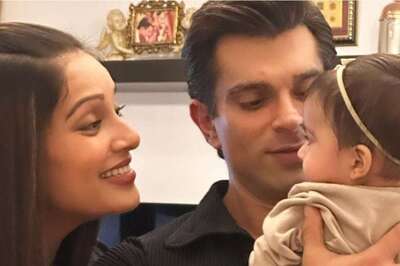
views
In 1954, a young cartoonist named Bal Thackeray sketched a caricature of Morarji Desai, the chief minister of the erstwhile Bombay State, on the front page of a magazine named ‘Mumbai'. Morarji, who was despised for his rejection of Marathi aspirations over the city of Mumbai, was depicted as a ‘narabhakshak’ (cannibal) standing on a heap of human skulls.
This represented the state repression of the ‘Samyukta Maharashtra’ movement, which called for the creation of a Marathi-speaking state of Maharashtra, with Mumbai as its capital. The movement opposed claims of Gujarat on Mumbai and the demand for the integration of the city into their proposed state.
After a long and arduous struggle, Mumbai remained with Maharashtra and the Maharashtrians, and the states of Gujarat and Maharashtra were born on May 1, 1960.
However, in 1954, Thackeray, whose father—social reformer and journalist ‘Prabodhankar’ Keshav Sitaram Thackeray —was among the doyens of the Samyukta Maharashtra movement, found himself on the wrong side of the law because of this cartoon. A case was registered, forcing Thackeray, who would later rise to become the founder of the nativist Shiv Sena (1966), and a later-day Hindutva demagogue, to go underground, though the arrest never happened.
Interestingly, a story that broke just around Maharashtra Day (May 1) this year, said that the central government had put paid to Maharashtra’s long-pending dreams of establishing an International Financial Services Centre (IFSC) in Mumbai.
The Centre’s gazette notification, dated April 27, said the IFSC Authority would be based at Gandhinagar, in Prime Minister Narendra Modi’s home-state, where the Gujarat International Finance Tec-City (GIFT) is located, instead of Mumbai, which was a claimant for the status.
With Gujarat’s gain turning out to be Maharashtra’s loss, this has predictably led to an uproar from the ruling ‘Maha Vikas Aghadi’ government, led by Shiv Sena president and Bal Thackeray’s son Uddhav. The Nationalist Congress Party (NCP) and Congress, which are part of the ruling alliance, have also jumped into the fray, while the BJP, whose Devendra Fadnavis was the Chief Minister from 2014 to 2019, is being forced into the defensive.
The Shiv Sena has gone for the jugular, with party MP and former union minister Arvind Sawant arguing that the decision was not in line with the Prime Minister’s ‘sabka saath, sabka vikas’ slogan. He called for the decision to be reconsidered, while raising concerns about Mumbai’s position as India’s financial capital being dismantled.
NCP chief and former union agriculture minister Sharad Pawar has written to Modi about this “erroneous and unwarranted” decision to establish the IFSC in Gujarat. He pointed to how this may be perceived as a move to shift financial institutions and business houses away from Mumbai, thus causing “unnecessary political disturbances”.
The veteran politician, who is seen as the glue keeping the unlikely allies in the MVA together, has advised the Prime Minister to take a rational decision, keeping aside “state politics”.
The Shiv Sena, which was born as a nativist party, is gradually framing a narrative about how the Centre, which is led by another man from Morarji Desai’s state, is chipping away at Mumbai’s status as the financial capital.
Apart from an emotional appeal, the issue of the gradual decline of Mumbai as a centre of commerce and trade will also resonate with the masses due to the obvious impact on direct and indirect employment.
Faced with rising majoritarian assertion, the Shiv Sena, which reinvented itself as a Hindutva force in the 1980s, may return to its nativist, Marathi roots to frame a larger sub-nationalist agenda about the Centre’s “injustice” against Maharashtra. In this, issues like the IFSC will figure prominently, as will the old grouse about Maharashtra getting a poor share in the devolution of taxes, despite being the largest contributor to the national exchequer, something that will become more relevant in the age of the lockdown-induced resource crunch.
To emerge as a regional force on the lines of political formations in the South, the party may use an agenda built around regional assertion and pride to counter the BJP’s Hindutva card.
The Shiv Sena’s break with the BJP, to ally with the “secular” Congress and NCP in Maharashtra, has restricted its ability to take up issues linked to hardline Hindutva, though it will have to strike a careful balance between the Marathi and Hindutva agendas.
In this move, it may be aided by the NCP, which like the Sena, is a regional party, with little stakes outside Maharashtra, though the Congress will have to play its cards carefully.
The Maharashtra government had earmarked a 50-acre plot in Mumbai’s Bandra Kurla Complex (BKC) business district for the IFSC project, which has been on the drawing board for almost a decade-and-half. During the Devendra Fadnavis regime, the Centre’s insistence had led to the state conceding some of this IFSC land for a bullet train terminal.
Soon after coming to power in 2004, the erstwhile Manmohan Singh-led United Progressive Alliance (UPA) government had established a committee under investment banker Percy Mistry to develop Mumbai as an IFSC. The committee submitted its report in 2007.
However, though the Centre received proposals from Maharashtra, Gujarat and Karnataka for setting up the IFSC, the global financial crisis in 2008 and a series of political upheavals delayed the final decision and roll-out.
Congress leaders like former chief minister Prithviraj Chavan have asked why Fadnavis did not question the Centre’s 2015 decision to approve the GIFT city as the location of the IFSC, overruling the claims of Mumbai, for which the concept was floated.
In 2017, then union finance minister Arun Jaitley had ruled out the possibility of another IFSC as the one at Gandhinagar was not being optimally utilised.
However, despite this, the Fadnavis government had maintained that the Mumbai IFSC plan was still on. It also established a task force under then union minister of state for finance Jayant Sinha to conceptualise the IFSC and collaborate with the GIFT. This also included BJP MP from Mumbai North Central Poonam Mahajan. The state also nominated superstar Amitabh Bachchan to the task force.
The Mumbai Centre for International Arbitration (MICA) was also established to create a strong legal and regulatory framework and institutional dispute resolution mechanism to boost the proposed IFSC.
However, the notification for establishing the IFSC authority at Gandhinagar may have officially sealed the fate of the plans for the centre in Mumbai.
But Fadnavis, who faces the not-so-easy task of justifying the Centre’s decision, has claimed that the erstwhile Congress-led governments in Maharashtra, had not followed up on the IFSC with the central government between 2007 and 2014.
Fadnavis said efforts should be made to ensure that the IFSC was also established at Mumbai, like in other countries, which had two such centres. The GIFT and BKC IFSCs could also complement each other. The Centre has also not rejected the Mumbai IFSC proposal, he added.
(Dhaval Kulkarni is a Mumbai-based journalist and author of ‘The Cousins Thackeray: Uddhav, Raj and the Shadow of their Senas’. Views are personal.)




















Comments
0 comment